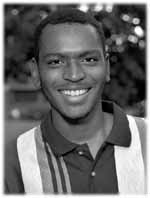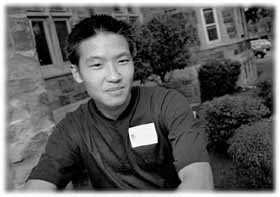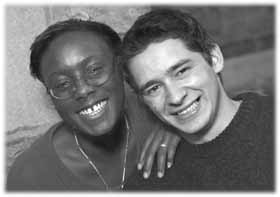|
PHOTOS: OWEN EGAN
The Reporter's Eric Smith caught up with students at a welcome party for the McGill International Students' Network last week at Martlet House. He asked students what drew them here from all corners of the globe.

Lily Chhatwal
U.S., India
Commerce
Nimal Sumanaweera
Sri Lanka, Tanzania
Biology
Between the two of them, Lily and Nimal have covered a good part of the globe. Born in Delhi, Lily grew up in Massachusetts. Nimal, originally from Sri Lanka, comes to McGill from Tanzania. Both say friends and family influenced their decision to come here. Lily told the Reporter, "My uncle originally came here from India and my sister attended here, so it's been in the family. They loved it. They said, 'You have to go. It's the best school.' My uncle said it brings out the best in you. 'They make you work so hard and at the same time you learn.' I remember his words for that." Nimal says, "So many friends of mine and their friends, their brothers and sisters, have attended here from my school in Tanzania. So I heard from them and I heard from some of my friends in Canada and the States. They talked about the reputation and also about Montreal."
|
 |

|
Rogelio Cuevas Mexico
Mechanical Engineering
Rogelio says he had the opportunity to participate in an exchange program for his degree in Mexico but decided instead to transfer to McGill and complete his BEng here. "I heard a lot about the University from some friends I met in Europe who were from Montreal. They were coming here and were very happy." The city itself was a deciding factor. "I like Montreal very much. I like the culture very much, there are a lot of concerts and theatre."
|

Angela Seferta UK
Biology
This is Angela's second year at McGill in a master's program in animal behaviour. Originally from Birmingham, she won a UK-McGill fellowship. "I'm enjoying it very, very much." Angela is involved with the McGill International Students' Network. "MISN basically introduces you to Canada, and introduces you to all the other international students and cultures from all around the world. I really respect McGill for having such a wide range of people from different countries."
|
 |

|
Aniedi Dear Barbados
Biology
Aniedi was born in Montreal, but has lived in Barbados for the last nine years. He says he chose McGill because "it's a good university. I like the whole atmosphere of Montreal with French and English." And although he says the size of first-year biology classes takes some getting used to, he adds, "Professors are cool  they try and liven up the discussions." they try and liven up the discussions."
|

Paw Sorensen Denmark
Civil Engineering
When Paw started looking at North American institutions for a semester of study towards his master's in Denmark, he was initially interested in an Illinois university, but says he chose McGill after finding out about it on the Internet. "I thought that Canada was more like Denmark than the States. I wanted to see what it's like in a big North American city. I saw McGill and I thought, 'This could be pretty exciting.'" His classes are good, he says, but three-hour lectures are long compared to 45-minute classes in Denmark.
|

Ayoh Kouli
France
Physical Chemistry
Stéphane Aloïse
France
Physical Chemistry
Ayoh and Stéphane came to Montreal together from Lyon, both to complete a year towards their degrees in physical chemistry. Ayoh says she wanted to study in English in Quebec and her advisor recommended McGill. She says some of the subject matter in her courses is new to her: "Classes are pretty hard for me because I've never seen the things I'm doing now. I understand the teachers when they speak English. But the courses themselves are sometimes a little bit weird for me." Stéphane says he's very happy with his courses so far. "A lot more initiative is asked of the students. It's less guided than in France and there's a much better infrastructure for individual study outside the classes. It seems like I will have to contribute much more personal work this year and that suits me well." And Ayoh adds, "It's nice to be in an English university in a French city, because you are not completely lost. You know you can speak French if you need to. It's a good asset for us."
|
|

